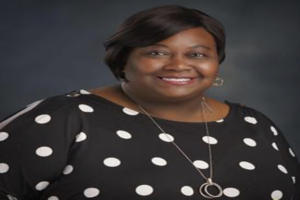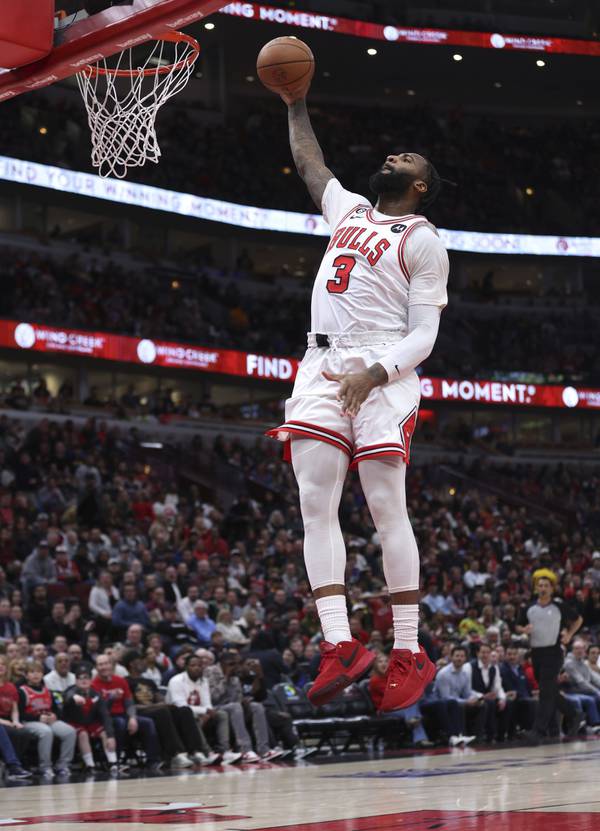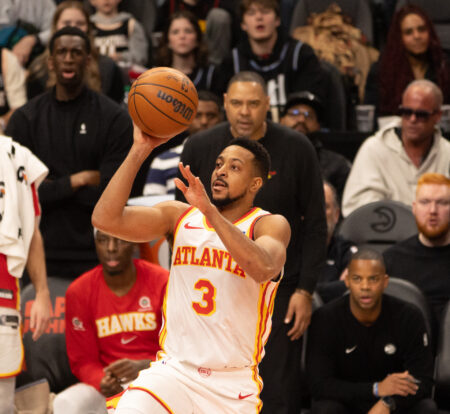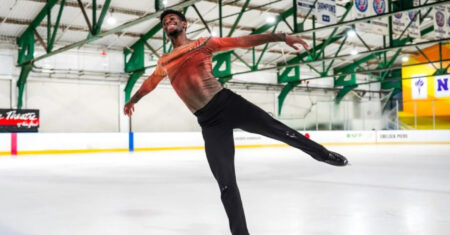Notice: Trying to get property 'post_title' of non-object in /home/ofzfvenynm4q/public_html/wp-content/plugins/wp-rss-feed-to-post/includes/wprss-ftp-display.php on line 109
Eight minutes. It wasn’t enough time.
Andre Drummond knew it. The rest of the Chicago Bulls lineup already had assembled on the court against the Clippers on March 27 in Los Angeles. Only eight minutes remained before the starter would be introduced, eight minutes before Drummond needed to take his place on the bench beside his teammates.
But Drummond was headed in the opposite direction, deeper into the arena, searching for the only name that made sense in that moment: Dr. Wendy Borlabi, the team’s director of performance and mental health.
He stood in front of her, searching for the words to describe all that had been clogging his mind for days, months, maybe years.
Eight minutes. It wasn’t even close to enough time to say everything he was thinking and feeling. But Drummond knew it was enough time to start.
“I don’t know what I’m going to say to you,” Drummond told Borlabi. “But I just need to say something.”
Two nights before, Drummond was sprawled on his back in a hotel bed in Los Angeles, trapped in a spiral, the same thought stuck on repeat: “I’ve got to get a f—— grip on my life. I’ve got to get help. I’ve got to talk to someone.”
Drummond wrote each thought down and made himself stare at his words. But it still wasn’t enough. He couldn’t force himself to talk to anyone — not friends, not teammates, not family.
Instead, he willed himself to sleep, awoke in a daze, went through the motions of the next day’s matchup against the Lakers. It was a decent game: He logged 12 points and eight rebounds in 18 minutes of a dominant Bulls win. But none of it felt right.
Drummond was drained, depleted. Since he was a child, the basketball court had been a sanctuary, a place he always could outpace his worries and anxieties. That Sunday, everything he tried to outrun the last seven years finally caught him.
After the final buzzer against the Lakers, Drummond couldn’t drag himself out of the locker room. One hour passed, then two, then three as he sank into his seat, trapped in a hollow echo.
“I was at a risk of having thoughts that I’m not supposed to have,” Drummond told the Tribune. “When you get to that point of being that low, what comes next?”
When Drummond stepped back from social media and sat out a second game against the Lakers, this time March 29 in Chicago, to focus on his mental health, it came as a surprise to fans, competitors and even his coaches and teammates. For the entirety of his 11-year NBA career, the 6-foot-11, 29-year-old center had projected an image of stoicism on and off the court.
But none of this was new for Drummond.
He can’t quite pinpoint when it started. Six, maybe seven years ago. It seeped in quietly, slowly — a sense of emptiness, a lack of purpose, a gradual unmooring in his daily life. Drummond didn’t define it as depression, but his time was commanded by a cloying sense of sadness he couldn’t shake.
The isolation and pressure began long before that — maybe when he was drafted into the league at 18, maybe even earlier when he gained national fame with the Connecticut Huskies.
Fame was a heavier burden than Drummond ever expected as a child dreaming of the NBA. He was achieving his dreams, but Drummond wasn’t prepared for the scrutiny, the sacrifice of privacy and the constant belligerence of fans on the internet.
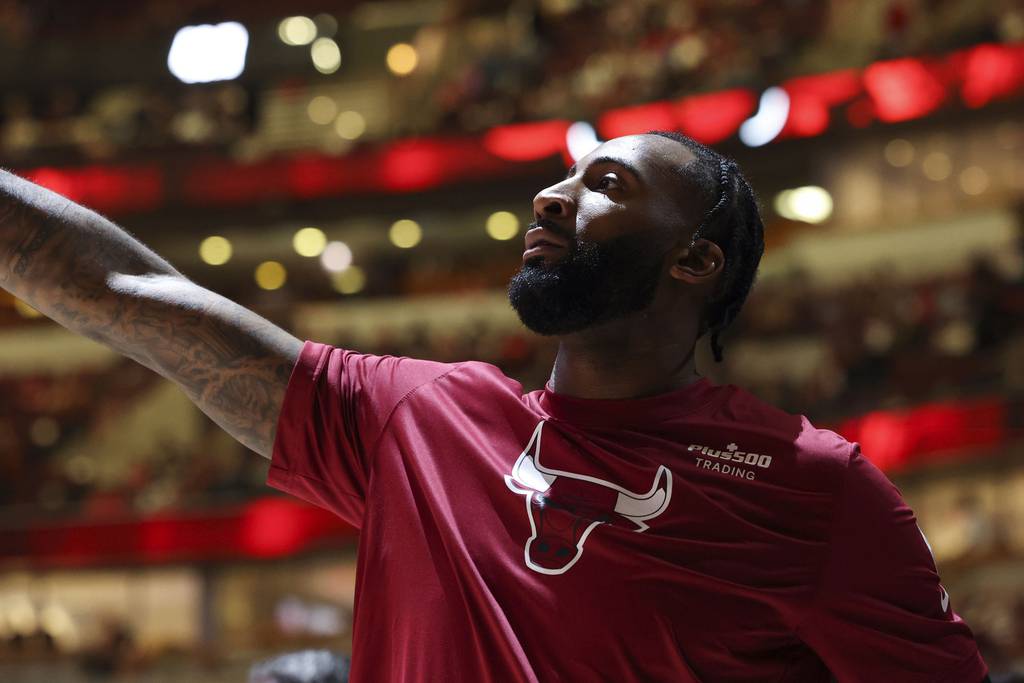
With each passing season, Drummond felt his life flattening out. He lost interest in childhood hobbies such as bowling, fell out of touch with longtime friends. All that mattered was basketball.
It wasn’t something Drummond ever wanted to talk about. He never saw himself as someone who could allow himself vulnerability, even with people he loved most.
“I’m f—— Andre Drummond,” he said. “I can’t be sad. I was always — not afraid, but I was like, damn, I don’t want to be looked at as soft. I’m too f—— big to be asking for help.”
So Drummond pushed it down, focused on the next game, told himself to be tougher. And when he was traded from Detroit in 2020 after eight years with the Pistons, he lost yet another anchor from his sense of self.
“There were times where I’d walk past a mirror and I’d look at myself and feel like — I don’t even know who I’m looking at right now,” Drummond said. “It was just a shell. I felt like a robot. I was just going through the motions, not feeling anything. I felt numb. Practice, go home, workout, repeat. It gets to a point where, damn, this just doesn’t even feel like who I am.”
When he landed in Chicago last fall, Drummond seemed poised for a change as he took the locker directly next to DeMar DeRozan.
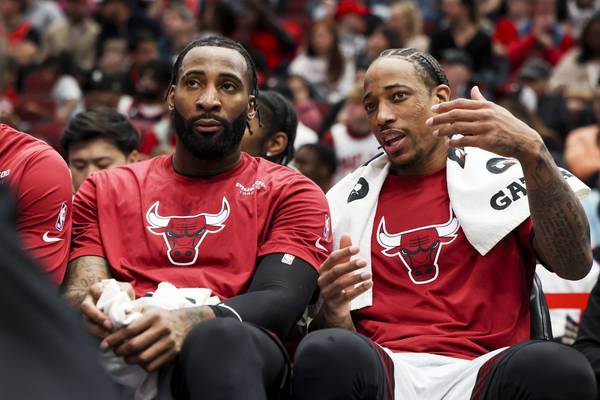
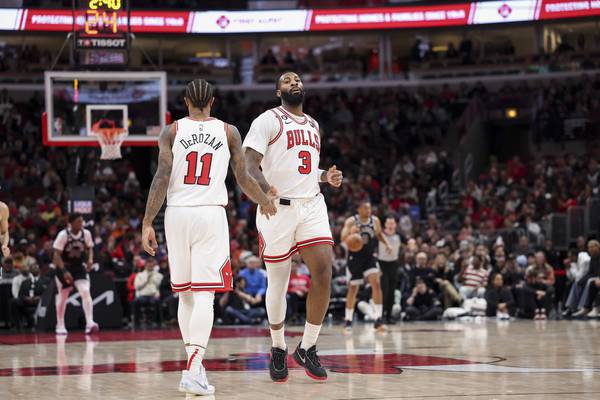
DeRozan and Drummond have known each other for a decade. They had a similar path — entering the league as a teenager, shouldering the pressure of a franchise only to be traded away. DeRozan spoke publicly about his depression in 2018, becoming a touchstone for mental health awareness in the league and urging teammates to talk through their struggles.
“We don’t care who makes what or fame when it comes to us. We know one another,” DeRozan told the Tribune. “Everybody else may look at us like NBA players who got a lot of money, there’s nothing to worry about. But we have a cheat code to have those conversations among ourselves. We can be that person for each other.”
That could have been — should have been — the moment when Drummond opened up.
It wasn’t.
His same insecurities won out every time. Drummond didn’t want to be soft or seem weak, didn’t want to burden anyone with feelings he thought a man should be able to conquer.
It’s not that he didn’t try. In the quiet before a game, Drummond would lean over to DeRozan, tap his arm and admit that he was stressed. DeRozan would tug out his headphones, talk through the matchup, find a way to make Drummond laugh.
For Drummond, those small moments felt like cracking himself open, pouring out just enough of the pain he was disguising to bask in relief for a few hours. But it was surface level. He needed more.
“Little by little, I felt myself crying for help,” Drummond said. “But I didn’t know how to ask for it.”
When he finally hit his breaking point, Drummond went to a professional, nearly 48 hours after that night in an L.A. hotel. The Bulls were playing a back-to-back set against the Clippers in the same arena that Monday night, March 27. Drummond warmed up with the Bulls like it was a normal game. But with minutes left before he was due on the court, he panicked, ditching his pregame ritual to find Borlabi.
If Drummond didn’t let this out, he wasn’t sure if he’d be able to play.
When he finally caught up with Borlabi in the Crypto.com Arena hallway, he still couldn’t push himself to start the conversation. This time, however, the person Drummond stood before was trained to recognize and respond to the type of crisis that was visibly cracking across his features.
When Borlabi asked Drummond if he needed to talk, everything overflowed.
“I felt myself getting emotional,” Drummond said. “I didn’t understand what was going on with me. This is a new feeling that I’m allowing myself to feel because normally I’d just suppress it — get over it, be fine, don’t worry about it, just push it down.
“I allowed myself to feel for the first time in a really long time. I just felt myself getting emotional and I’m like, yo, I gotta f—— say something to someone. I’m losing my mind right now and we play in, like, eight minutes.”
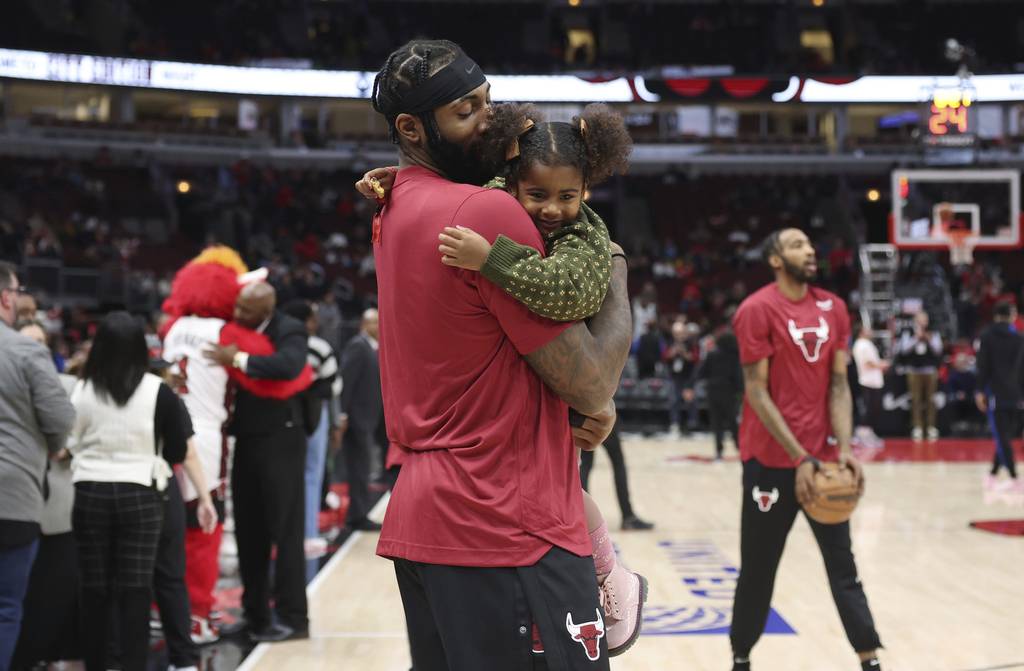
Drummond needs this to be clear: He didn’t buy the whole therapy thing. At least not at first.
Those were his first words to Borlabi as they huddled in the corner of the locker room: “I’m going to be honest with you, I don’t believe in none of this s—.”
Drummond didn’t fully understand how therapy was supposed to work. His image of the whole scenario involved a fancy couch, a stuffy doctor, maybe some tissues. And Drummond couldn’t see how a man like himself fit into that picture.
“I feel like you guys are paid to just give us the right answer,” Drummond told Borlabi. “What can you tell me about what I’m going through to make me feel better?”
Borlabi didn’t argue or defend the process. She laughed. And after a moment of looking at her in stunned silence, Drummond began to laugh as well for the first time in too long. It was the first step in forging a relationship that has radically shifted Drummond’s view of himself and mental health care.
Borlabi’s role on the Bulls became a necessity when the NBA adopted a policy in 2019 requiring teams to maintain a full-time licensed psychologist or behavioral therapist on staff.
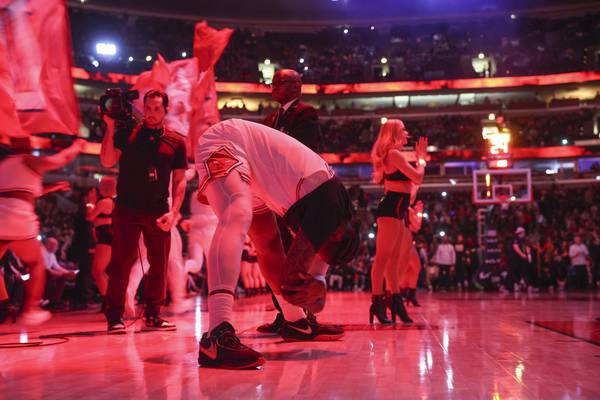
Borlabi provides mental health care to Bulls players throughout the season. The nature of an NBA schedule means it’s not a rigorously structured role; rather than scheduling mandatory sessions, Borlabi is embedded with the team to create genuine bonds aimed at helping players feel comfortable about therapy.
Borlabi recognizes she’s often the first mental health professional that most Bulls players have engaged with, which creates a challenge and responsibility for her.
NBA players are trained to shy away from honesty. Their lives are held under scrutiny and intense pressure. At the same time, they’re socialized to exude strength. Calling an NBA player “soft” is one of the sharpest insults, yet protecting and preserving mental health requires athletes to access a deep level of vulnerability.
So it’s no surprise to Borlabi when athletes such as Drummond are resistant to therapy. Rather, the lack of familiarity informs how she approaches each day on the job.
Borlabi emphasizes casual language, preferring the phrase “mental wellness” over “mental health.” She focuses on tangible goals to help players articulate their needs.
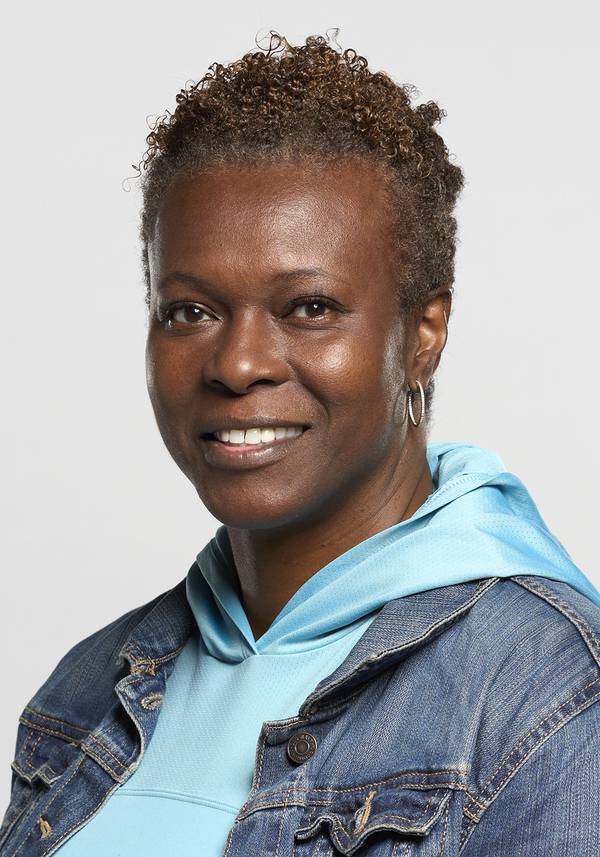
“I try not to label,” Borlabi told the Tribune. “It’s about what you’re feeling, what you’re thinking and then how do we work with that.”
Borlabi wears Bulls gear and travels to away games, visibly signaling her role with the team. Most of her early interactions with players and staff consist of conversations over breakfast and lunch on the road or at their facilities in Chicago. But Borlabi makes it clear to players that their communication — whether a joke over a meal or a serious divulgence — will remain confidential in her role as a licensed psychologist.
Ultimately, Borlabi hopes this approach will establish a baseline of trust. That way, when players reach a moment of crisis like Drummond faced in Los Angeles, they’ll know it’s safe to come to her — not as the team therapist, but as Dr. B.
“They’re able to see that I am someone that has nothing to do with money, playing time or anything else,” Borlabi said. “I’m really just here for them.”
Drummond’s initial weeks of therapy hinged around removing stressors to allow him to breathe.
He took one game off to center himself before returning for the playoff push. Borlabi identified social media as “white noise” that only worsens the pressure athletes feel. In response, Drummond handed his accounts over to his agents to keep from being overwhelmed by online negativity.
And while Drummond was distrusting of therapy at first — previously lacking the language and expertise to seek it for himself — he found sessions with Borlabi made immediate sense.
“You don’t realize that therapy is not about giving you the right answer,” Drummond said. “It’s about hearing the s— you’re saying. It’s about understanding and articulating what’s coming out of your mouth because it’s stuff that you think, but you don’t say out loud. When you actually physically hear what you’re saying out loud, you’re like holy s—, I need to do this more. You feel a weight off your shoulders.”
Since his first day of embracing therapy, Drummond didn’t want to keep it a secret.
He could have covered it up, hiding his one-game, midweek absence with a vague moniker on the injury report. But too many of Drummond’s mental challenges stemmed from a suppression of emotion he felt was intrinsic to his masculinity.
If he could show even one person he was wrong, that his strength stemmed from seeking help, Drummond knew speaking out would be worth it.
Chicago Tribune Sports
Weekdays
A daily sports newsletter delivered to your inbox for your morning commute.
The reaction was immediate. Drummond received an outpouring of support on social media. Borlabi has been invited to speak at two elementary schools in Chicago whose educators hope to use Drummond and DeRozan as guideposts to teach students the benefit and bravery of seeking mental health care.
DeRozan knows there’s longevity to vulnerability. Five years after sharing his story, he is still approached at games and hotels by fans whose lives were affected by his words.
“We have to talk about it,” DeRozan said. “Now that we’re talking about it on a consistent basis, that alone does so much to put it on the forefront. It gives us the confidence to want to talk about it and tell our stories. The more stories that are told, the more confidence it gives in someone else’s life.”
Drummond knows this is only a first step. His three weeks of therapy have offered more questions than answers, and it will take much longer to unspool everything he has felt over the past seven years.
But even in those rushed minutes in the halls of the Clippers’ arena, Drummond began to regain something he didn’t even realize he was seeking: peace.
“Talking to a doctor, being consistent with it — it feels good,” Drummond said. “I still have a longer journey to go, but the process has started. I’m starting to feel myself changing little by little, getting back to the basics, rekindling friendships that I lost over the time and pushed by the wayside while I was stuck being lost as a person.”
“There were so many times where I knew what I was feeling, but I chose to neglect it and push it down. Now going through this, I know it makes you so much stronger to be able to articulate what you’re feeling.”

